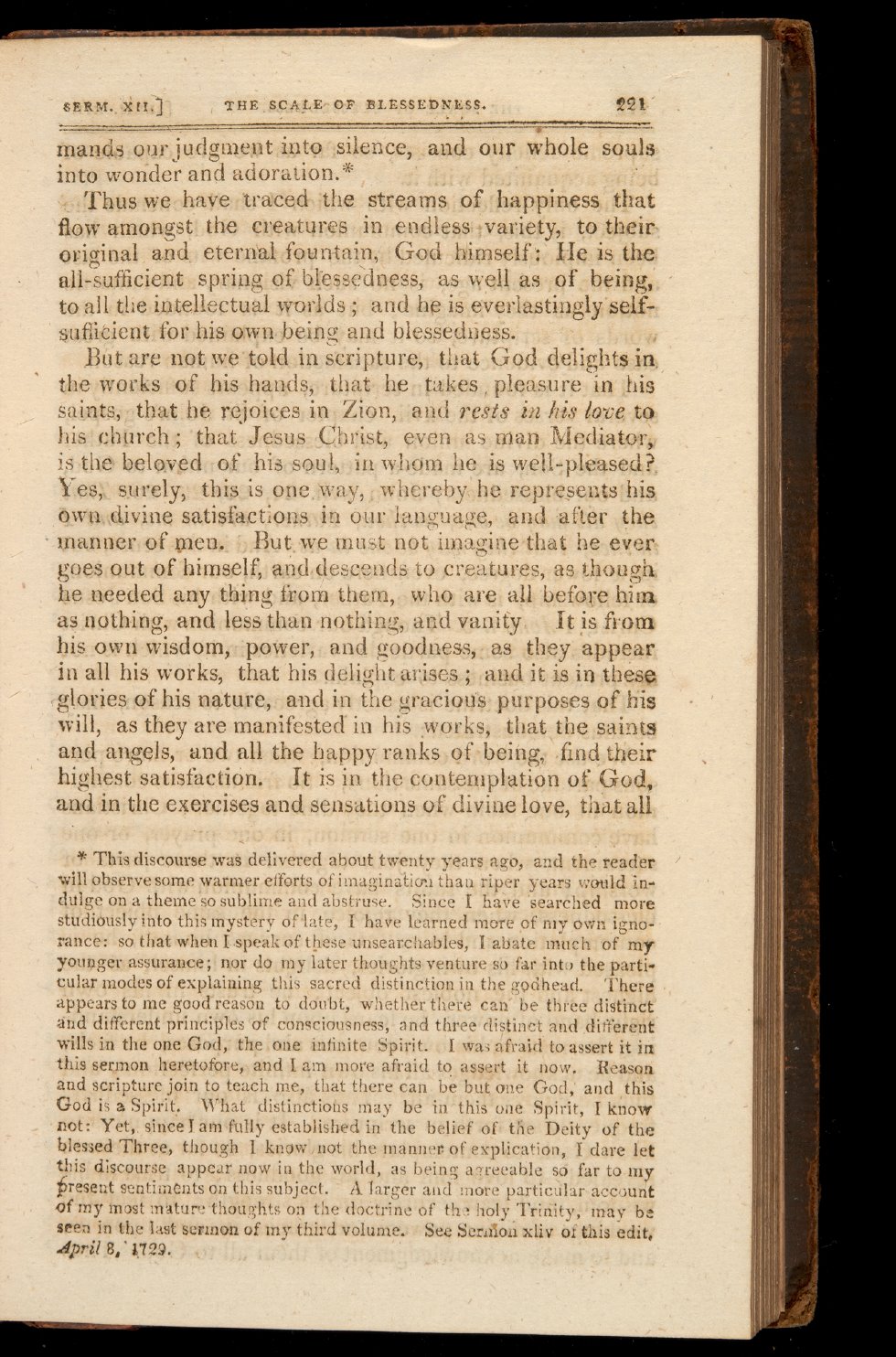

BERM.
*IL]
THE
SCALE,
OF
BLESSEDNESS.
t21
mands our judgment into
silence,
and
our
whole souls
into
wonder and
adoration.
Thus
we
have
traced
the
streams
of
happiness
that
Row
amongst
the
creatures
in
endless variety, to
their
original
and.
eternal
fountain,
God
himself
Ile
is
the
all-
sufficient
spring
of
blessedness, as
well as
of
being,
to
all
the
intellectual
worlds
;
and
he
is
everlastingly self-
sufficient
for
his own
being and
blessedness.
But
are
not
we
told
in
scripture,
that God
delights
in.
the works
of
his
hands,
that
he
takes
pleasure
in his
saints,
that
he rejoices
in
Zion, and
rests
in his
love
to
his
church
;
that Jesus
Christ,
even as man
Mediator,
is
the beloved
of
his soul, in whom he
is
well-
pleased
?.
Yes,
surely, this
is
one.
way,
whereby
he
represents
his
own
divine
satisfactons
in
our
language, and
after the
manner
of
,men.
But
we
must
not
imagine
that
he
ever
goes
out of
himself,
and.descends
to .creatures, as though.
he
needed any thing
from them, who
are
all
before
him
as
nothing,
and
less
than
nothing, and vanity.
It
is
from
his own wisdom, power,
and
goodness,
as
they
appear
in all his works,
that
his
delight
anises
;
and
it
is
in
these
glories of
his
nature,
and
in
the
gracious purposes
of
his
will,
as they
are
manifested'
in his
works,
that
the
saints
and
angels,
and
all
the
happy ranks of
being,
find
their
highest satisfaction.
It
is
in
the
contemplation
of
God,
and
in
the exercises
and
sensations
of
divine
love,
that
all
*
This
discourse was
delivered about
twenty
years ago, and
the reader
will observe some
warmer
efforts
of imagination
than riper
years
would
in-
dulge
on a
theme
so
sublime and abstruse. Since
I
have searched
more
studiously into this mystery of
late,
I have learned more of my
own
igno-
rance:
so
that
when
I
speak
of these unsearchables,
I
abate
much
of my
younger assurance;
nor do my
later thoughts venture
so
far
into
the parti-
cular
modes of
explaining this sacred distinction
in
the godhead.
There
appears
to
me good
to
doubt, whether there can' be three
distinct
and
different principles
of
consciousness,
and
three distinct and different
wills in
the
one
God, the
one infinite
Spirit.
I was
afraid
to assert
it in
this
sermon heretofore,
and
I
am more
afraid
to
assert it
now.
Reason
and scripture join
to
teach
me,
that there
can be
but,
one God,'
and this
God
is
a Spirit. 'What distinctions may be
in
this
one
Spirit,
I
know
not:
Yet,.
since
I
am fully
established
in
the belief
of
the Deity of the
blessed
Three, though
I
know,not the manner of explication,
I
dare
let
this
discourse
appear
now
in
the
world,
as
being a7reeable
só
far to my
Present sentiments
on
this subject.
A
larger and
more
particular
account
of
my
most
maturethoughts
on
the doctrine of
ti-:a
holy
Trinity,
may
be
seen
in
the
last sermon
of my third
volume.
See Seraaon
xliv of this
edit.
dpril

















